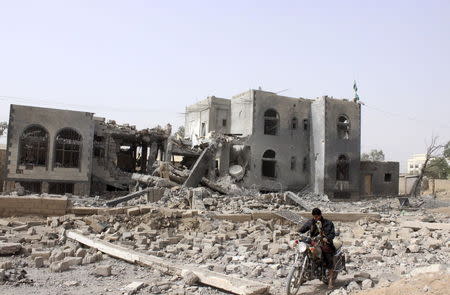A Houthi building destroyed in Saudi Arabia's air campaign. Yahoo/Reuters.
Saudi Arabia has launched over 130 airstrikes in 24 hours at Houthi targets in Yemen. Yahoo/Reuters. The UN has criticized the attacks because they may have violated intentional law. Many of the strikes targeted the Houthi stronghold city of Saada. Though the coalition called on civilians to evacuate the city, it was unlikely that many made it out due to fuel shortages. The bombing of Saada is in response to cross border shelling by the Houthis.
My Comment:
Sounds like the Saudis are pulling out all the stops now. It isn't surprising since the Houthis did shell their territory as well. Such an attack demanded a response and 130 airstrikes is one hell of a response. It almost sounds like the Saudis destroyed most of the city of Sadda. That is going to put a dent in the Houthis ability to wage war.
If the rumors of a truce are true, this attack could be seen as a way to force the Houthis to the bargaining table. If the pace of these airstrikes keeps up, the Houthis may accept a cease fire just to buy time to recover from them. They may also be convinced that the war is unwinnable. The fact that they aren't getting much help from their Iranian masters isn't helping things either. Either way, Saudi Arabia's position after these airstrikes is stronger then it was before they happened.
It's important to note the weaknesses of an air campaign. Though an air campaign can degrade the war fighting ability of the Houthis, air power alone can't defeat them. If we learned anything from the 20th century, it is that airstrikes alone can't win a war. For that you need boots on the ground. Sure there are Yemeni loyalists still in the fight, but if the Houthis don't give up, the only option to defeat them is for Saudi Arabia and their allies to deploy ground troops.
As for the strikes being illegal, my guess is that they are. Most people have a dim view of civilian causalities, and they tend to have a problem when people don't go out of their way to prevent them. I prefer a more nuanced view. Obviously, killing civilians for no purpose is an atrocity, but I also dislike the kind of half measures that these kinds of laws force onto warfare. Sure killing civilians in airstrikes is horrible. But if these airstrikes cause the Houthis to quit the fight, then it is worth it.
A ground war in Yemen would have much higher casualties, civilian and otherwise, then these aggressive airstrikes will cause. Ground conflicts always have larger casualties then air campaigns, especially when you are fighting in an urban area. Any invasion by the Saudis would be brutal and would kill thousands. Not to mention all the people that would be displaced. If airstrikes that kill a few innocent people could end that, then it is probably worth it.
Of course, history may not be so kind to the Saudis. After all, I just said that airstrikes alone can't win war. It is just as likely that these strikes won't force the Houthis to negotiate and may push more civilians into joining them. In warfare nothing is simple, and oftentimes you end up causing the problem you are fighting to get even worse.
My prediction is that these strikes are the prelude to an invasion. Getting the Houthis to the negotiating table is a secondary goal, but not a necessary one. Saudi Arabia and their coalitions goal for Yemen is to counter the influence of Iran. Just like Syria and Iraq, Yemen is nothing more then a proxy war between Iran and the Arab States. And it seems like the Saudis are winning in Yemen, as well as in Syria. Iran is winning in Iraq, while other factions are fighting both sides. All I know for sure is that this proxy war will continue for the foreseeable future.

No comments:
Post a Comment